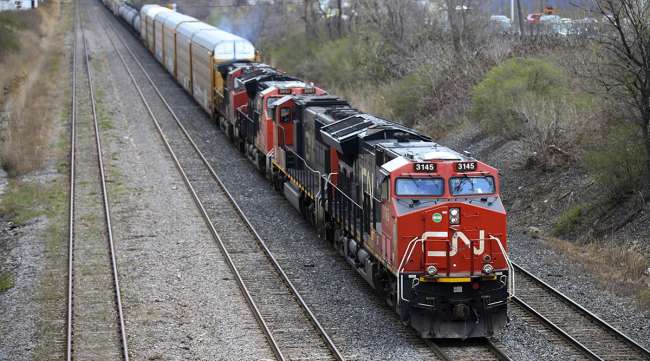Bloomberg News
CN Railway Misses Estimates as Consumer Goods Shipments Drop

[Stay on top of transportation news: Get TTNews in your inbox.]
Canadian National Railway Co. spelled out a challenging picture for the North American economy as earnings fell short of expectations in the third quarter, partly due to falling demand for consumer goods.
Revenue dropped 12% from last year to C$3.99 billion ($2.9 billion), missing analyst estimates of C$4.05 billion. On an adjusted basis, the railway’s earnings came in at C$1.69 per share, missing Bloomberg consensus estimates by 3 cents.
Intermodal shipments were down 34% from the same period last year.
“Our consumer-related business — particularly the intermodal business — continues to be murky,” Chief Executive Officer Tracy Robinson told analysts, adding that summer port strikes in British Columbia hurt the business.
Still, Canadian National reiterated the guidance it gave investors in July for a “flat to slightly negative” change in earnings per share this year. The Montreal-based freight operator is sticking with its target of 10% to 15% earnings growth per year over the next three years. “I believe we’ve seen the bottom on volumes,” Robinson said.
The railway’s revenue from shipments of forest products and chemicals and petroleum fell by double-digit percentages in the quarter. But grain and fertilizer revenue was up 16%, and automotive rose 14%. The United Auto Workers strike, which began in September, had little impact.
Trimble CEO Rob Painter discusses the company’s continued investment in the freight transportation industry and its vision for a more connected supply chain. Tune in above or by going to RoadSigns.ttnews.com.
In addition to a slowing economy, Canadian railways are also contending with the hangover from the port strikes, which forced some traffic to reroute to U.S. west coast ports. It’s unclear if the volume shift to the U.S. is temporary or if it will be a challenge for Canadian railways over the longer term, RBC Capital Markets analyst Walter Spracklin said in a note prior to the earnings.
Fuel surcharges were down because of lower energy costs, crimping revenue. The company’s operating ratio, which measures expenses against revenues, was 62 on an adjusted basis, above its target of 60.
The board approved a 13% boost in the budget for share buybacks, to C$4.5 billion.
Want more news? Listen to today's daily briefing below or go here for more info:





